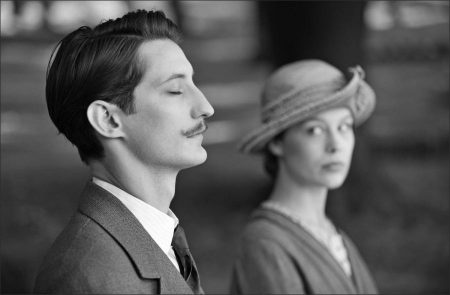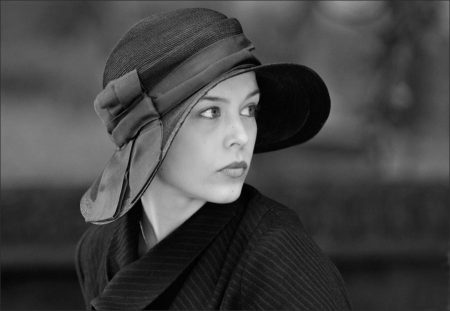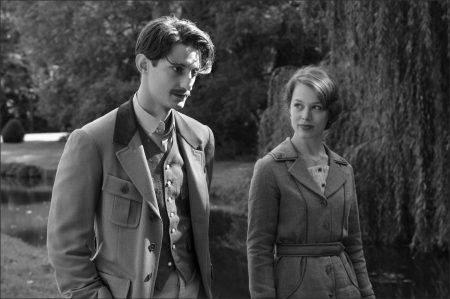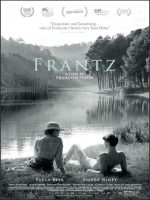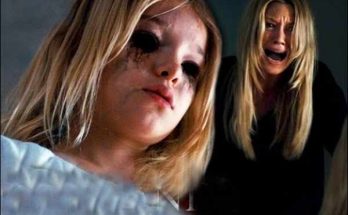Frantz Movie Storyline. Set in Germany and France in the immediate aftermath of the First World War, (1914-1918), Frantz recalls the mourning period that follows great national tragedies as seen through the eyes of the war’s “lost generation”: Anna (21 year-old Paula Beer in a breakthrough performance), a bereft young German woman whose fiancé, Frantz, was killed during trench warfare, and Adrien (Pierre Niney,
Yves Saint Laurent), a French veteran of the war who shows up mysteriously in her town, placing flowers on Frantz’s grave. Adrien’s presence is met with resistance by the small community still reeling from Germany’s defeat, yet Anna gradually gets closer to the handsome and melancholy young man, as she learns of his deep friendship with Frantz, conjured up in evocative flashbacks.
What follows is a surprising exploration of how Ozon’s characters’ wrestle with their conflicting feelings – survivor’s guilt, anger at one’s losses, the overriding desire for happiness despite everything that has come before, and the longing for sexual, romantic and familial attachments. Ozon drew his inspiration from Ernst Lubitsch’s 1932 drama Broken Lullaby, with stunning visual references to painter Caspar David Friedrich.
Frantz is a 2016 drama film directed by François Ozon. It was selected to compete for the Golden Lion at the 73rd Venice International Film Festival. At Venice the film won the Marcello Mastroianni Award. At the 42nd César Awards, Frantz was nominated in eleven categories. Edouard Manet’s painting Le Suicidé is referenced a few times in the story.
Film Review for Frantz
rançois Ozon is nothing if not a restless film-maker. Despite his ridiculously prolific rate (he’s the Woody Allen of France, churning out one to two films a year), he seems adverse to ever being labelled an auteur. He’s tackled everything from a classic Gallic farce (Potiche), to a murder mystery (8 Women), to an erotic thriller (Swimming Pool), all with varying degrees of success. With an Ozon joint, you never quite know what you’re going to get.
Yet still his latest comes as a big surprise. A largely black-and-white loose adaptation of the 1932 Ernst Lubitsch drama Broken Lullaby, which was in turn based on a play by French playwright Maurice Rostand, Frantz is also mostly told in German – a first for the director. It lacks the cheeky humour that characterised his three most inspired hits (8 Women, Potiche and Sitcom), instead favouring the mournful tone of his drama Under the Sand. Still, Frantz feels like new territory for Ozon.
He radically shifts from the source material by imagining the entire second half of the story (which fittingly is the best part of the film). Vitally, Ozon has also changed the entire perspective to put a woman at the core of the tale. The original centered on a young Frenchman, who visits the titular German’s soldier’s grave after the end of the first world war. Frantz instead focuses on the German’s fiancee, who strikes up a quasi-romantic relationship with the mysterious stranger after he enters her life.
Ozon is often at his best when working with women, and he has a fabulous talent in Paula Beer to bring his protagonist, Anna, to vivid life. She’s stunning in the role.
When we first meet Anna, she’s understandably morose and quiet, having recently lost the love of her life to war. Her parents are eager to marry her off to another German suitor, but she’s unwilling to entertain the option. She perks up with the surprise arrival of Adrien (Pierre Niney), a lanky Frenchman with a sexy moustache, who claims to have been close friends with her late partner. Initially, her father wants nothing to do with the man (“Every French man is my son’s murderer,” he snarls). Adrien proves to be such a charming presence, however, that even Anna’s family soon come around to embracing him.
Not long into Frantz, Ozon boldly shifts to full-blown colour for some key sequences. The flashbacks, recounting Adrien’s time spent with Frantz in Paris (they tour the Louvre; Adrien teaches Frantz how to play the violin), do away with the gloomy aesthetic, as does a lovely scene that sees Anna and Adrien grow closer over the course of a long hike in the mountains. The colour affords such needed respite from the misery that affects Anna’s circumstance, that when Ozon plunges back into darkness, it hurts. The Pleasantville-like approach is undeniably distracting, but its cumulative effect pays off profoundly in a final shot that’s too special to spoil.
Ozon tends to favour a twisty narrative, and again offers a juicy one here that makes further plot description impossible. Suffice it to say that the film’s best stretch involves Anna journeying to Paris and take on a more active role as detective. It’s thrilling to watch such a sullen character finally take flight.
Frantz (2017)
Directed by: François Ozon
Starring: Pierre Niney, Paula Beer, Ernst Stötzner, Marie Gruber, Johann von Bülow, Cyrielle Clair, Alice de Lencquesaing, Axel Wandtke, Rainer Silberschneider
Screenplay by: François Ozon, Philippe Piazzo
Production Design by: Michel Barthélémy
Cinematography by: Pascal Marti
Film Editing by: Laure Gardette
Costume Design by: Pascaline Chavanne
Set Decoration by: Maresa Burmester, Catherine Jarrier-Prieur
Art Direction by: Susanne Abel
Music by: Philippe Rombi
mpaa Rating: PG-13 for thematic elements including brief war violence.
Distributed by: Music Box Films (United States), Mars Films (France)
Release Date: March 17, 2017 (Uniked States), September 7, 2016 (France), September 29, 2016 (Germany)
Views: 136
